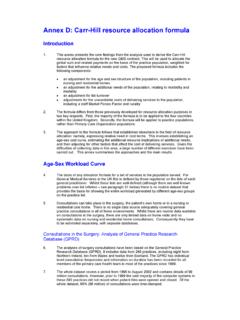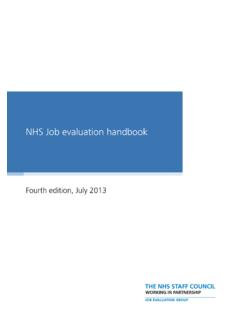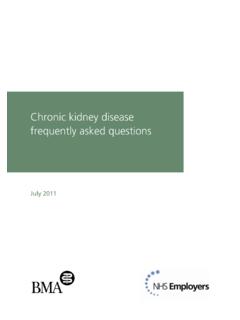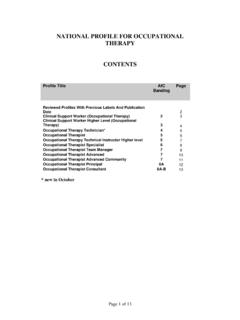Transcription of The Involvement of Black and Minority Ethnic Staff in NHS ...
1 The Involvement of Black and Minority Ethnic Staff in NHS Disciplinary Proceedings A report of research carried out by the Centre for Inclusion and Diversity, University of Bradford on behalf of NHS Employers and NHS Institute for Innovation and Improvement The InNHS D ResearchProfessorDr Aliya D March 20 ISBN 997 DisclaimeThis publiNHS Instiand NHS made of tContact UniversityBradford BEmail: nvolvemDisciplihers r Uduak ArDarr 10 78 185143 er cation doetute for InnInstitute fohe informay of BradfoBD5 0BB, oinary Prchibong 264 6 es not necenovation anor Innovatioation.
2 Rd, Centre Telephonechibong@bf BlackProceedessarily refnd Improveon and Impfor Inclusie: 01274 and Mdingsflect the poement. Theprovementon and Div236347 Minoritosition or oe Universitt are not liaversity x: 01274 2y Ethnopinion of Nty of Bradfoable for any236443 nic StafNHS Emploord, NHS Ey use that 1ff in oyers and Employersmay be 1 s 2 CONTENTS PAGE Contents .. 2 Acknowledgements .. 3 Executive summary .. 4 Chapter 1: Introduction .. 9 Chapter 2: Methodology .. 15 Chapter 3: Disciplinary data, policies and practices in the NHS.
3 25 Chapter 4: Perceptions and experiences of BME Staff networks in relation to disciplinary proceedings .. 40 Chapter 5: Comparative review of other public sector organisations .. 54 Chapter 6: Conclusion .. 62 References .. 76 Appendix I .. 80 Appendix II .. 81 Appendix III .. 82 Appendix IV .. 83 3 ACKNOWLEDGEMENTS This study was undertaken with the support and guidance of a large number of organisations and individuals. We are indebted to members of NHS Employers Equality and Diversity Core Reference Group whose initial concern about the Involvement of BME Staff in disciplinary proceedings led us to conduct this piece of research.
4 Once underway, the study was guided by members of the Disciplinary Research Advisory Group with useful insights and assistance given by members of the main Trades Unions RCN, RCM, UNISON and Unite/CPHVA. The process of data collection was assisted greatly by a team of facilitators - Dr Neslyn Watson-Druee, Bijal Ruparalia and the cooperation of participants who kindly volunteered to take part in the study, including human resources managers, service managers, representatives of health professional regulatory bodies, members of BME Staff networks, the Pan-London Equality and Diversity Network, the NHS Confederation BME Leadership Forum and the National BME Committee of the Ambulance Service.
5 We are extremely grateful to the service managers who were involved in the later stages and whose Involvement helped us to ensure that the recommendations arising from the study were grounded in the real world of the NHS. We would like to thank NHS Institute for Innovation and Improvement for funding the partnership which culminated in this research, and for the specialist support and useful insights provided by Liz Maddocks-Brown. We would like to acknowledge the commitment and considerable assistance made by Maroline Lasebikan in her capacity as an independent adviser for this research.
6 We are also grateful to members of NHS Employers, particularly Professor Carol Baxter, Paul Deemer and Mohammed Jogi for their invaluable contributions throughout the study and their helpful comments on earlier versions of this report. Despite all the above contributions, the researchers remain responsible for any errors or misunderstandings reflected in this report. 4 EXECUTIVE SUMMARY It is clearly important that NHS organisations have the ability to apply disciplinary procedures to their Staff , usually as a last resort, in order to ensure that Staff behave in an appropriate and professional manner.
7 Anecdotal evidence and a growing body of empirical studies indicate that Black Minority Ethnic (BME) doctors are more likely to be referred to the GMC and to be on long-term suspension. Similar problems are known to exist within nursing. Comparatively less is known about the experiences of Minority Ethnic Staff from other occupational groups and in non-clinical posts within the NHS. In response to concerns raised by human resources managers about this issue, the present study was undertaken between June 2008 and November 2009 to assess the extent of Involvement of BME Staff in disciplinary procedures within the NHS and to identify good management practice in this area.
8 More specifically, the objectives were to analyse trusts disciplinary data to assess whether Black and Minority Ethnic Staff were overrepresented in disciplinary procedures, examine reasons for the Involvement of BME Staff in informal and formal disciplinary proceedings and engage with professional regulatory bodies to examine monitoring systems in relation to disciplinaries. The study also compared literature on the experience of disciplinary proceedings amongst BME Staff working in other public sector organisations and identified examples of good practice in relation to fair and transparent disciplinary proceedings.
9 The study was undertaken in four distinct phases. Firstly, we conducted a web audit of 398 NHS trusts in order to compare the disciplinary rates of BME Staff with their white counterparts; secondly, we examined disciplinary policies and practices of NHS trusts through workshops with 11 human resources managers and 9 representatives of health professions regulatory bodies; thirdly, we analysed the experiences and views of 91 Staff at five BME Staff network events and related forums. Finally, we conducted a literature review to compare the experience of BME Staff Involvement in disciplinaries within the NHS with those working in other public sector organisations.
10 In addition, we undertook two workshops with 30 service managers to validate the solutions suggested by the research participants to ensure that the recommendations would be relevant and workable by the end users. Disciplinary data, policies and practices in NHS trusts Despite the statutory requirement laid down by the Race Relations Amendment Act (2000) to publish annual statistics relating to the number of Staff involved in disciplinaries broken down by ethnicity, our web audit revealed only one-fifth (80) of all NHS trusts published recent disciplinary data of this nature that could be included in our study.
















